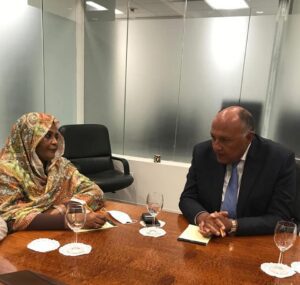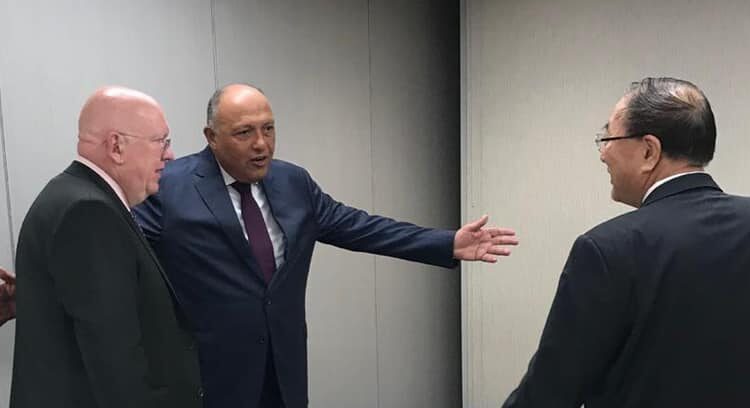Cairo stresses need for UNSC to assume responsibilities towards dam file
Security Council meets Thursday to discuss Nile dam issue
Foreign Minister Sameh Shoukri stressed Tuesday the need for the United Nations Security Council to assume its responsibilities towards the issue of Ethiopia’s Nile dam.
The foreign minister remarks came during his meeting with the permanent representatives of Russia and China in the Security Council in New York Tuesday in which he highlighted Egypt’s firm position towards reaching a binding legal agreement on the dam.
Foreign Minister Shoukri held a series of other meetings during his current visit to New York to explain Egypt’s position on the Grand Ethiopian Renaissance Dam (GERD) as Ethiopia has announced that it started the second stage of dam filling.
The foreign minister held meetings with each of the ambassadors of the Arab Committee concerned with following up on the developments of Ethiopia’s dam file and coordinating with the Security Council as well as the permanent delegates of the African Group in the Security Council, permanent delegates and representatives of Estonia, Ireland, Mexico and Norway, which are current non-permanent members of the Security Council.
Minister Shoukri reviewed during these meetings the firm Egyptian position on the dam issue, which is the need to reach a legally binding agreement on filling and operating the dam that takes into account the interests of Egypt, Sudan and Ethiopia and preserves Egypt’s water rights.
These intensive meetings come as part of preparation for the upcoming session of the United Nations Security Council on the dam issue, which will be held Thursday at the request of Egypt and Sudan to discuss the GERD issue in a bid to resolve the currently stalemate and find a fair and balanced agreement that achieves the interests of the three countries.

Shoukri held a meeting with Sudanese Foreign Minister Mariam al-Mahdi, as part of continued coordination and consultation between the two countries on the developments of the Ethiopian dam file and in preparation for the UNSC session.
The two ministers agreed on the need to continue extensive contacts and consultations with the member states of the Security Council to urge them to support the position of Egypt and Sudan and to support their call for the need to reach a legally-binding agreement on the filling and operation of the dam that takes into account the interests of the three countries and preserves the rights of the two downstream countries Egypt and Sudan.
Shoukri and al-Mahdi voiced their “categorical” rejection of Ethiopia’s announcement, saying it reveals Ethiopia’s “ill” intention to impose a fait accompli on downstream countries and indifference to the foreseeable negative impacts and damages, according to a statement released by the Egyptian Foreign Ministry Tuesday.
Both ministers also said the unilateral filling represents a “blatant” violation of the Declaration of Principles agreement signed between the three countries in 2015 and a violation of international laws and norms governing the exploitation of transboundary river resources, the statement added.
The statement said that Minister Mohamed Abde-Aati received an official letter from his Ethiopian counterpart confirming that Ethiopia started the second phase of filling the reservoir of the dam.
The Foreign Ministry also forwarded the letter sent by the Ethiopian water minister to UNSC president to inform the Council of this dangerous development in light of the Council planned session Thursday .
In response to the Ethiopian letter, Abdel-Aati sent an official letter to the Ethiopian minister voicing Egypt’s categorical rejection of Ethiopia’s unilateral act, a statement by the Irrigation Ministry spokesman read.
This development, the statement said, once again reveals Ethiopia’s bad faith and its insistence on taking unilateral measures to impose a fait accompli and to fill and operate the dam without an agreement that takes into account the interests of the three countries and limits the damages of this dam on the two downstream countries.
This will aggravate the crisis and increase tension in the region. It will also create a situation that threatens security and peace at the regional and international levels, added the statement.






Discussion about this post